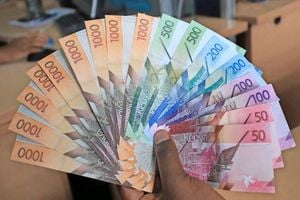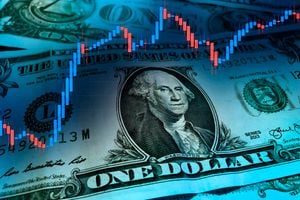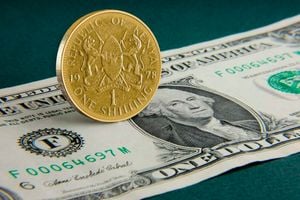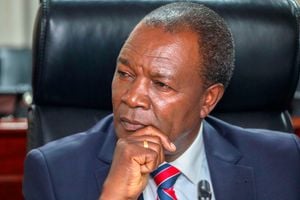Breaking News: Former Lugari MP Cyrus Jirongo dies in a road crash

Kenya issued its fifth Eurobond bond on February 14.
“The markets have opened. Eurobond default risks evaporated. Speculative dollar positioning unwinding. That popping sound you hear is Azimio bubble bursting,” David Ndii, President William Ruto’s economic advisor, said on his X account on Friday morning.
Dr Ndii's comment captures what is fast turning into a crescendo of relief for the administration of President William Ruto whose officials had been scratching their heads on how they would repay the $2 billion (Sh217.5 billion) Eurobond amid a tight global financial market.
The tight global financial market had earlier in June 2021 spooked Treasury mandarins in the administration of retired President Uhuru Kenyatta forcing them to shelve plans to issue a $1 billion 12-year Eurobond due to high interest rates demanded by investors.
Zambia, Ghana and Ethiopia, which had all issued Eurobonds, have defaulted as chickens come home to roost for African countries that had gone on a borrowing spree in early 2000s.
The strengthening of the dollar, the war in Ukraine and the lingering effects of the Covid-19 pandemic combined to roil the global financial markets making it expensive for frontier countries such as Kenya to raise dollar debts such as the Eurobond.
Domestically, a prolonged drought had reduced the harvest of critical export products, with the flow of the country’s foreign exchange (forex) turning into a trickle. With reduced dollar reserves, repayment of the $2 billion was a nightmare.
“If you ever find yourself in a hole, then the first thing you do is to stop digging deeper,” said President Ruto, noting that his first priority was to stop borrowing.
But because the budget remained big, with the Kenya Kwanza administration coming with its own new policies such as the Hustler Fund, that money had to come from taxes.
Egged on by the International Monetary Fund (IMF), the Ruto administration turned up the tax knob, introducing a myriad of measures that have had the effect of pushing up the cost of living among Kenyans, according to a World Bank report.
Thanks to these tax measures—which the President in his Jamhuri Day speech last year admitted were ‘painful’—the path to the Eurobond repayment has been one of tears and blood.
While there are those whose outlet has been comic relief, christening President Ruto ‘Zakayo’ as they compared him with the Biblical tax collector Zacheus, others could not hide their frustration and took to the streets culminating into a bloody standoff between the protestors and the police.
Motorists had to pay the standard 16 per cent value-added tax (VAT) from eight percent while salaried workers were slapped with a 1.5 per cent Housing Levy that was to be used to build social and affordable houses.
A myriad of excise duties was introduced even as the compliance threshold was raised with companies such as alcohol manufacturers being made to pay excise duty, or sin tax, on a daily basis.
But the President stuck to his guns, and the controversial Finance Act, 2023 became law.
But the climax of all this came on Wednesday when Kenya finally issued its fifth Eurobond bond. Proceeds of the dollar bond would be used to buy back some of the debts held by investors of the $2 billion issued 10 years ago by the Jubilee Administration. Dr Ruto was then deputy to retired President Uhuru Kenyatta.
Terms for the Eurobond were slightly punitive with the country expected to pay an interest rate of 9.7 per cent, higher than that which will be paid by Cote D'ivoire and Benin. Plus, everything seems to be falling into place.
Suddenly, the shilling was gaining against the dollar, driving panic amongst rich Kenyans who were holding this foreign currency, and who were now offloading them.
A catastrophic ending in the form of debt default had not only been averted, this major political score by the Kenya Kwanza administration had been topped up with a rally in the shilling.
And it might as well be a coup de grace for the Opposition outfit Azimio Coalition as Dr Ndii suggests. Its leader, the former Prime Minister Raila Odinga, aided by the Ruto administration, is hunting for a job as the chairperson of the African Union. So far, the Opposition has looked clueless in the face of the present financial quagmire.
Some eight years ago, Mr Odinga, fresh from exposing how the National Youth Service (NYS) had been looted of close to Sh1 billion, single-handedly added the term ‘Eurobond’ into the growing lexicon of terminologies as associated with graft in Kenyan-speak.
His target was the $2 billion Kenya raised in 2014. Part of the proceeds, about $1 billion according to Odinga, never hit the government’s account at the Central Bank of Kenya (CBK).
Never mind that weeks after the Treasury had issued the Eurobond, forex reserves rose by $1.1 billion to $7.4 billion, figures from the CBK showed. Much of this cash, the financial regulator said, came from the sovereign bond issuances.
Mr Odinga’s accusations started when the then Controller of Budget Agnes Odhiambo told the Public Accounts Committee of the National Assembly that monies were withdrawn from the offshore account that held the billions raised through the Eurobond under suspicious circumstances.
A month before Kenya went to the Eurodollar market in June, President Kenyatta assented to changes made to the PFM Act which gave then Finance CS Henry Rotich sweeping power to borrow on behalf of the government, moving those powers from the National Assembly.
The President had also been forced to pay Sh1.4 billion for Anglo Leasing. The multi-billion Anglo leasing scam involved the award of contracts to procure passport printing machines to fictitious companies.
But Kenya was to pay this money if it accessed the global capital markets in London, with part of the money being used to settle a loan it had taken to fund the 2013 elections.
Around the time that Kenya issued its first Eurobond, the IMF said in one of its reviews that there were promising commercial prospects for oil discoveries to have the potential of providing significant foreign exchange and fiscal resources.
But a large chunk of the Eurobond cash was to fund infrastructure projects, mostly in transportation, energy and agriculture, such as the Galana Kulalu Food Security project which would then help the economy to grow and repay the loan.
The government knew repayment of this Eurobond would be tough. Thus, the Kenyatta administration had plans of setting up a sinking fund for the eventual repayment of the Eurobond, according to the IMF.
Kenya’s risk of default was medium, according to debt stress tests conducted jointly by the IMF and the World Bank. By the end of 2014, debt to gross domestic product an indicator of a country’s liquidity, was 47.9 per cent.
For every Sh100 the country received in taxes, only Sh14 went to interest payments. Ten years later, when the country was ready to repay this Eurobond, mostly by issuing another Eurobond, most of these fundamentals had changed for the worse.
Its debt to GDP is at 68 per cent. Tax as percentage of GDP is at 68 per cent.
For every Sh100 that the country collects in taxes, about Sh40 goes into the payment of interests, largely due to expensive Eurobond and Chinese loans.
S&P rating is still b+ but with a negative outlook, which means Kenya might be downgraded in the next review.
Kenya’s risk of default is high, according to the December 2022 debt sustainability report by the IMF and the World Bank.
Plus, the relief over the repayment might be short lived, some analysts reckon.
Rufas Kamau, a financial analyst, while responding to Ndii’s comments on X, said that the Eurobond default risk didn't evaporate.
“It was just delayed and the lot size increased,”said Kamau.












